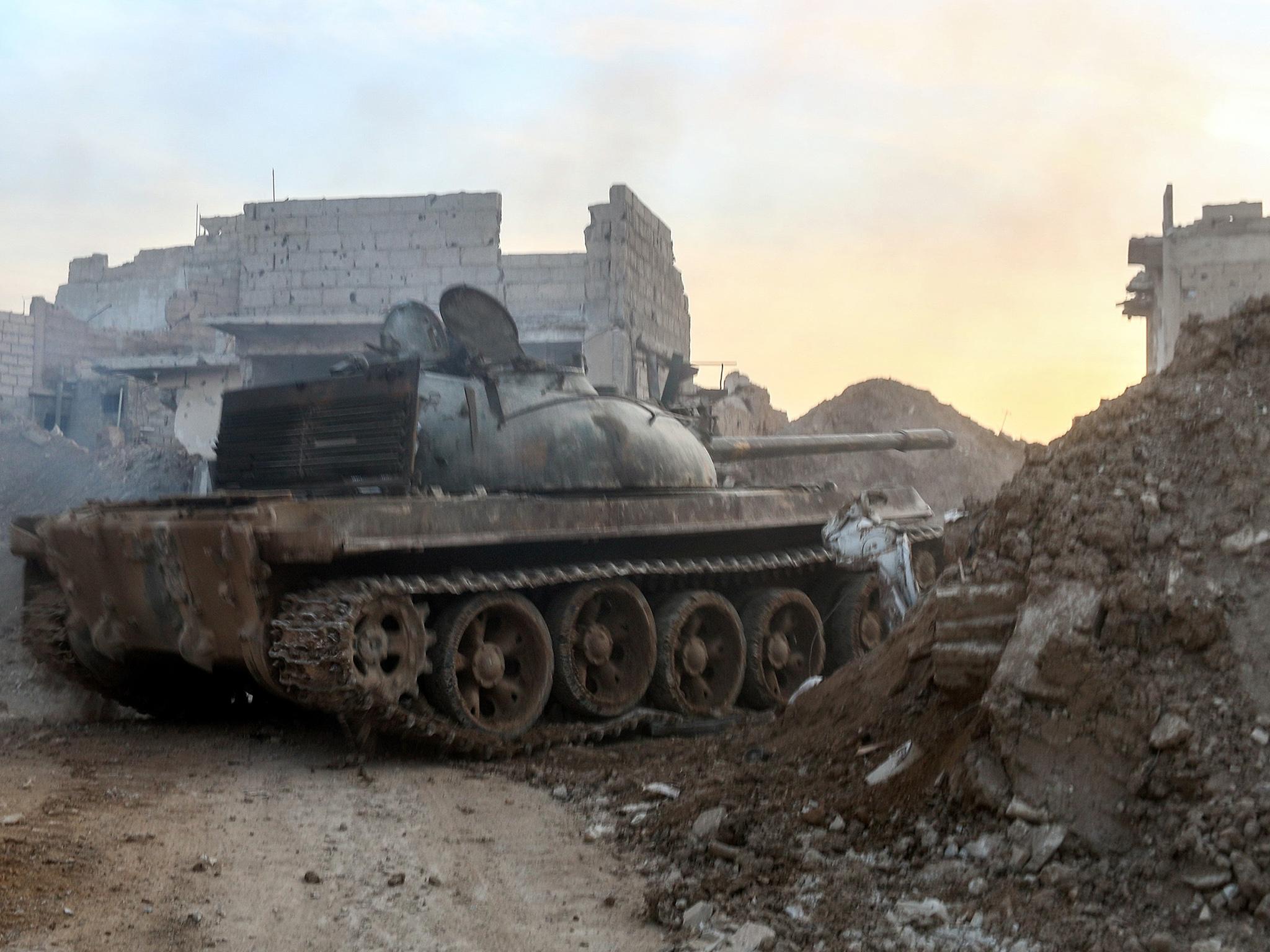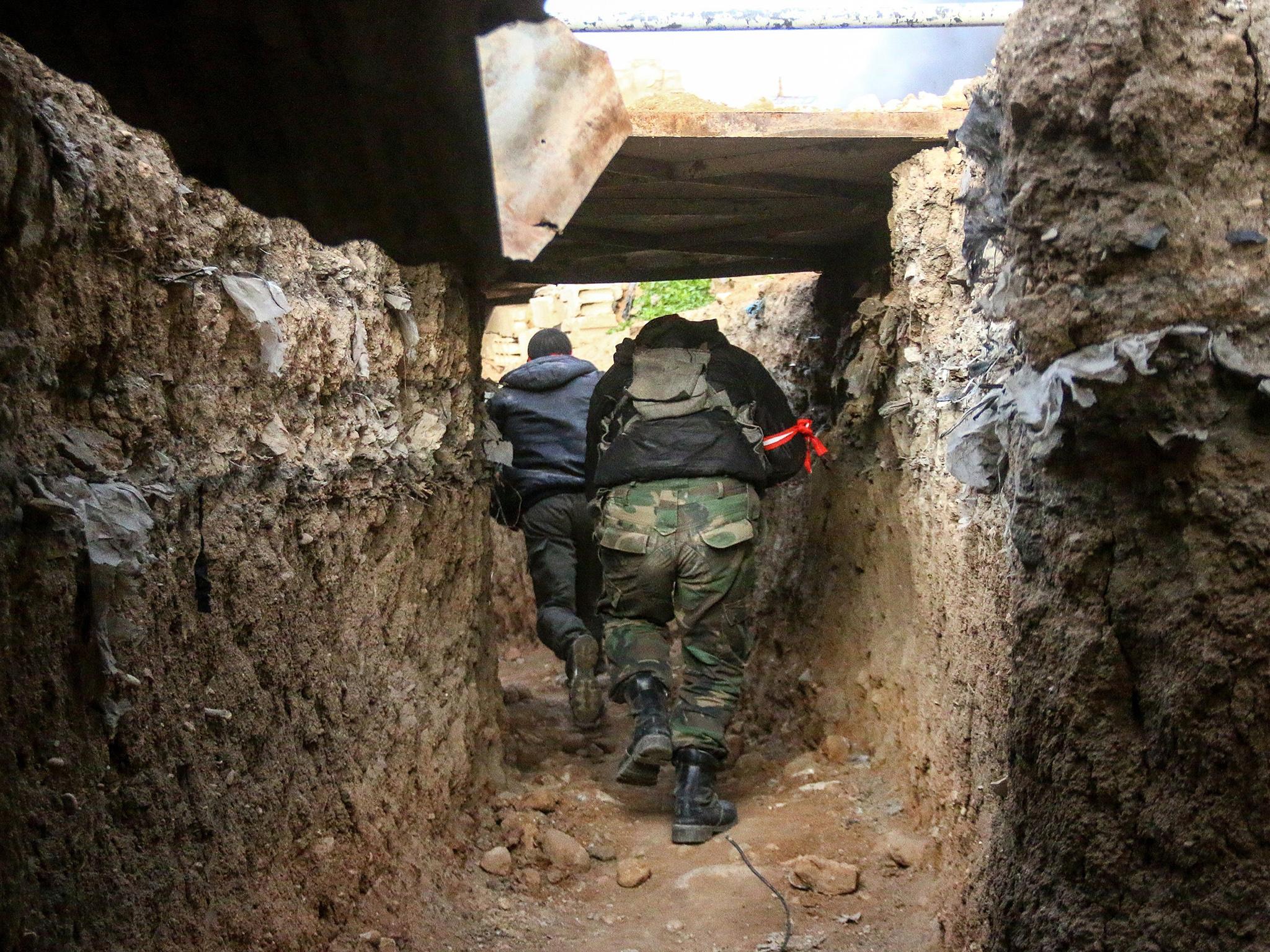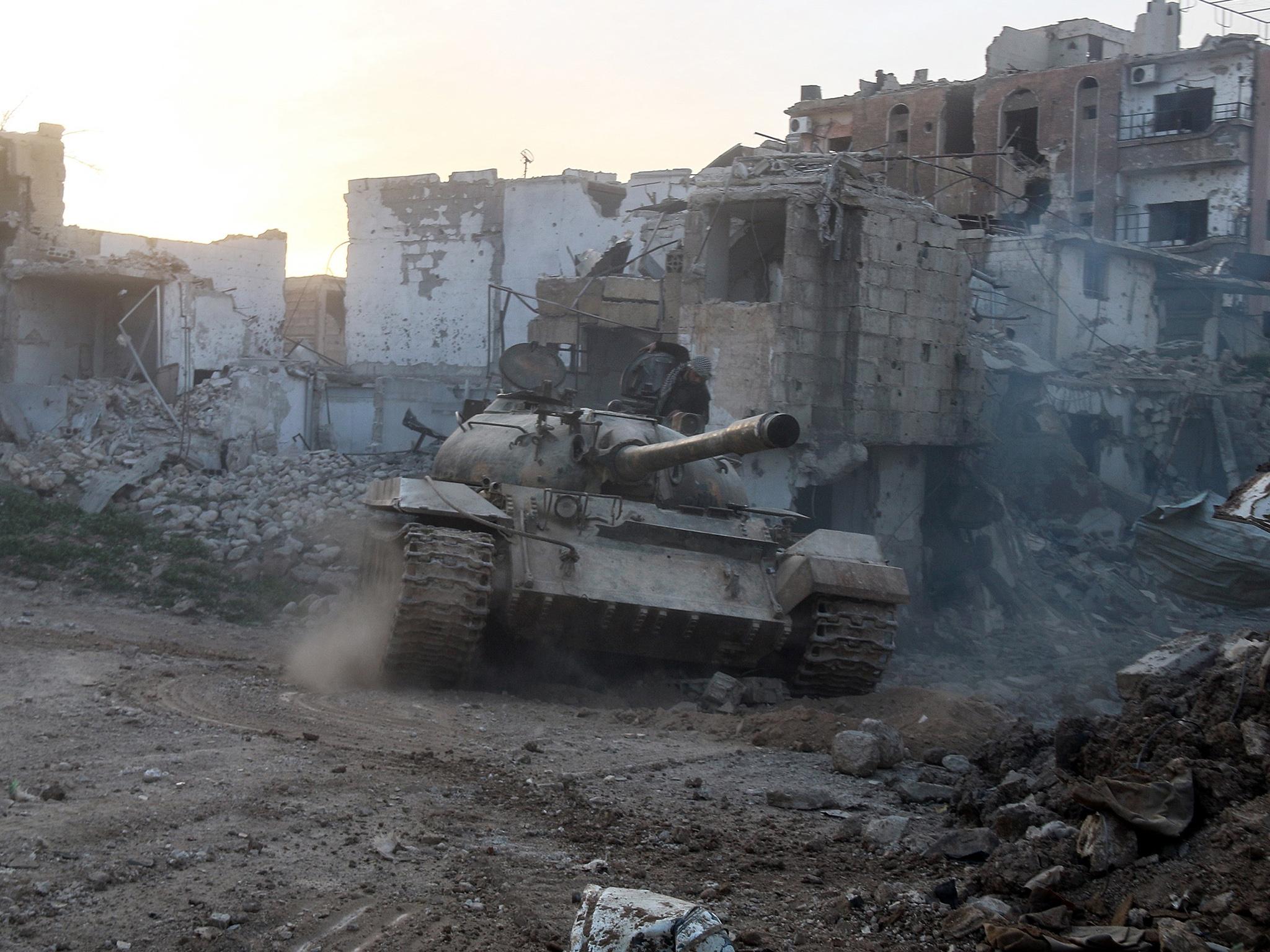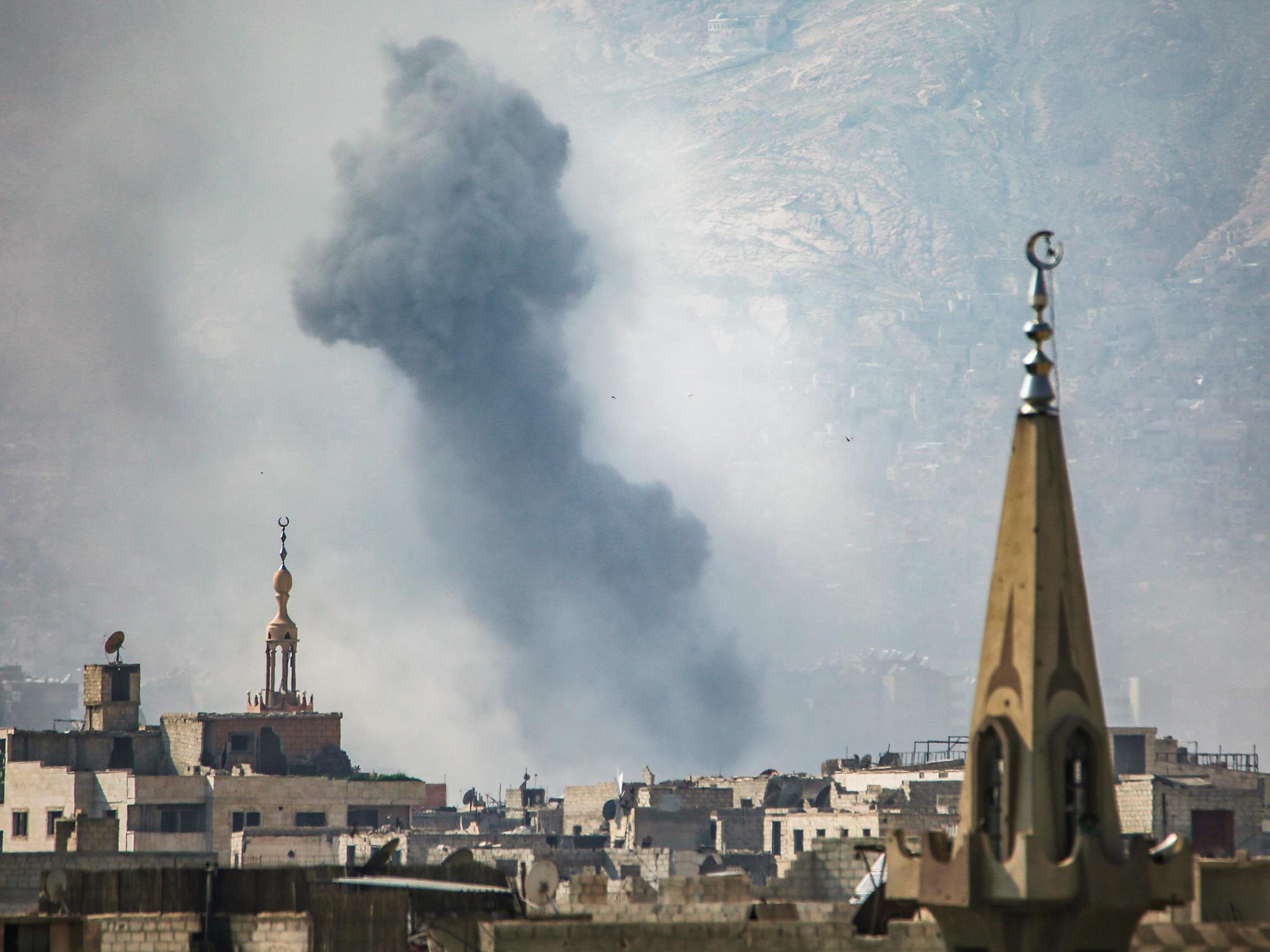Tanks, suicide bombs and bayonets: On the front line in the battles around Damascus
Endgames: inside Syria and Iraq In the first in a series of exclusive dispatches from the crucible of war, Robert Fisk reports from Syria’s capital, where regime soldiers are fighting hand to hand with opposition fighters

Your support helps us to tell the story
From reproductive rights to climate change to Big Tech, The Independent is on the ground when the story is developing. Whether it's investigating the financials of Elon Musk's pro-Trump PAC or producing our latest documentary, 'The A Word', which shines a light on the American women fighting for reproductive rights, we know how important it is to parse out the facts from the messaging.
At such a critical moment in US history, we need reporters on the ground. Your donation allows us to keep sending journalists to speak to both sides of the story.
The Independent is trusted by Americans across the entire political spectrum. And unlike many other quality news outlets, we choose not to lock Americans out of our reporting and analysis with paywalls. We believe quality journalism should be available to everyone, paid for by those who can afford it.
Your support makes all the difference.The soldier was grinning, his wounds bandaged but blood still on his hands. He had the weary, cynical, joyful eyes of a man who had survived. Gunfire cracked around the little concrete hut in which he talked, outgoing mortars and a tank that blazed away into Jobar every few minutes from an outcrop of the Qassioun mountain.
“They came in their hundreds,” he said. “They came in suicide cars and when we tried to rocket them, they came out of tunnels under the ground.” There were, said his comrades, maybe four thousand in all. Jabhat al-Nusra, of course, one of the brand names of al-Qaeda that now dominate the rebel forces in the area. And then another soldier said something strange. “They talked in classical Arabic.”
But yes of course they would, wouldn’t they? A literary language, the language of the Quran. The wounded soldier repeated this. “They shouted Allah Akbar, over and over again. Yes we’ve talked about it among ourselves, what makes these people fight, this Wahabi-Salafist ideology. We had to fight so close that one of us had to use a bayonet to stab one of the attackers in the chest to save the life of another soldier.”
For this man, the battle started at 5am on Monday and finished three hours later when a bullet smashed into his arm. He still doesn’t know how he escaped. He pointed upwards with his finger, the traditional way of telling you that it was God’s work. By evening that day, the gunfire was scarcely half a mile from the gates of the ancient Roman city.
Up close to the old international highway to Homs and the north of Syria, there are now spanking new Russian main battle tanks reversing in clouds of black dust, anti-aircraft guns to fire over open sights and a batch of mortars that sent shells quivering over our heads today into the great, smashed industrial estate of Jobar, a wasteland of vast concrete and iron factories into which the Nusra men – one junior Syrian officer said they numbered in all a staggering 4,000 – emerged on Monday. Grey smoke billowed hundreds of feet out of the carcasses of factories as jets repeatedly bombed at low level. Rule of thumb: if you can’t see the planes, they are Russian. I could see these Migs. They were Syrian.

At one point this week, some Damascenes feared that Nusra might break into the very centre of the city, and Gulf television presenters gleefully announced the news. “They” didn’t make it, although I found a Syrian television crew permanently stationed in Abassiyeen square, partly, I suspect, to prove Al-Jazeera and the other anti-Bashar [al-Assad] Gulf channels are lying if they claim that Nusra have crossed the broken sports stadium on the eastern side.
But what was it about, this sudden explosion of Nusra/al-Qaeda fighters this week? To mark the start of Syria’s revolution seven years ago? To take the shine off the detritus of eastern Aleppo after the government’s capture of the enclave? Or – and this was the favourite within the Syrian army today – an opposition game to give its divided leadership more power to win points and wreck the latest round of “peace” talks in Geneva this week.
Either way, it appears to have run itself into the ground. Syrian troops are back inside the dust of the factories, digging their own tunnels now – you have to take their word for it, and even then it’s all a bit late if it’s true – and the tanks up on Qassioun are pouring their fire onto the highway between Qaboun and Jobar to prevent the Nusra forces moving reinforcements of ammunition and food to the south. High up on the rockside, you can just see the bloom of their fire – big, golden and obscene – and it takes all of 12 seconds for their shells to rumble across north-eastern Damascus and land in Jobar.
The civil population of this partly middle-class suburb, Sunni Muslims for the most part, fled their homes here years ago – if they haven’t moved into Mezze and other areas to the west, many have apparently and rather oddly moved to Greece – so this is an all military battle, fought between men who have come to like fighting, the army yet again claiming a victory. One soldier said he thought 500 Nusra men had been killed. As usual, no one spoke of prisoners.
Maybe the best way of illustrating how this latest phase of the Syrian war is being fought is to let soldiers talk for themselves. It’s a story of tunnels – so many tunnels, just as there were in the siege of Homs and the siege of eastern Aleppo and, in an intriguing parallel, amid the equally smashed Sheikh Najjar industrial estate north of Aleppo two years ago. Here is the wounded soldier.
“We were in the textile factory and at 5am [on 20 March], we saw a suicide car coming towards us. We knew it was coming, we tried to rocket it. They were shelling us. One car bomb was near our factory and it exploded and it made a break [in the wall] in the north front of the factory. We regrouped, but in minutes they were sneaking in from the other side of the factory. Then another group came out of a tunnel, to the left of the factory. Then there was another huge suicide bomb driven at us.”

The same soldier’s colleague spoke of more car bombs. “On the second day, it was difficult to move because of the huge amount of damage and all the smoke. We retook all the territory we’d lost and encircled hundreds of them. It was a fierce battle but then another suicide bomber came at us. This time it was a BMP [a Russian armoured vehicle, probably captured from the Syrians in the early stages of the war] full of explosives. We stopped them reinforcing from Qaboun [to the north].”
There was another car bomb, some of the fighting taking place this time inside the ruins of yet another factory that once made orange crush juice. A third soldier. “We could hear on their radio that one of their groups was trapped and he was shouting desperately to his comrades outside: ‘If you don’t evacuate us and the other wounded now, we will abandon our position.’ All the attacks involved waves of fighters but they were all surrounded by the army.”
Even given the tendency for soldiers to exaggerate their abilities, it’s clear that the Syrian army has recovered much ground. But can they hold it? There’s a lot of machine-gun fire and artillery fire being sent into Jobar by the army now – and remember, much of this area has been a Nusra stronghold for years – but where does all the Nusra ammunition come from? I spoke to a soldier in Seif al-Dawla street close to a tracked anti-aircraft gun draped with iron nets to shield it from anti-armour rockets.
“A month ago, we raided a house at Barzi [north of Damascus] and we found more drones than you can imagine. Whole rooms packed with drones – at least three rooms. Where did they get them?” There is some debate among the soldiers. Many, with varying degrees of contempt, blame Turkey, Qatar, Saudi Arabia and the US in that order (there may be more than a little truth in this, of course), although Nusra is also still fighting with guns and vehicles originally captured from the Syrian army itself.

“Everything that happens here is linked to something else – attacks and peace conferences,” Raed said. He was a 25-year old volunteer soldier from Idlib – as an only son, he cannot be forced to fight – standing next to an old traffic warning sign of better days which cautioned motorists that they were approaching “dangerous corssroads”. Dangerous indeed. There’s an unhappy dividing line west of Jobar where the wedge of apartment blocks between there and the old city is almost all Christian, but this war has now taken on such routine clothes that I found soldiers casually speeding off on motorcycles to buy sandwiches.
Another climbed wearily from the back seat of an old yellow city taxi, Kalashnikov in hand, roughly bearded – a surprising amount of Syrian soldiers now sport vast bushy beards, not unlike their Nusra opponents, though this is military fashion chic rather than Quranic chic. But you’ve got to refocus on the tired guy with the AK. A soldier comes to war by taxi. Now that’s something to think about. And in a weird way, more impressive than the clutch of monstrous new tanks I watched a mile away, next to the smoke of Jobar.